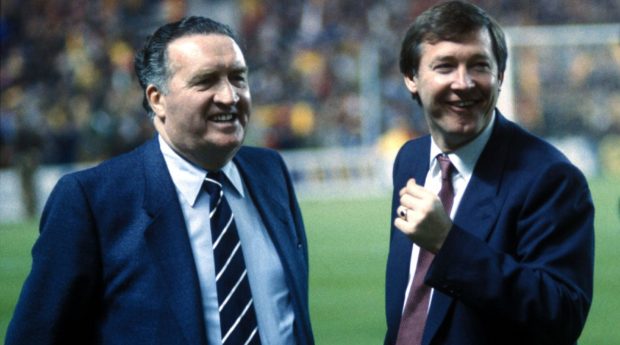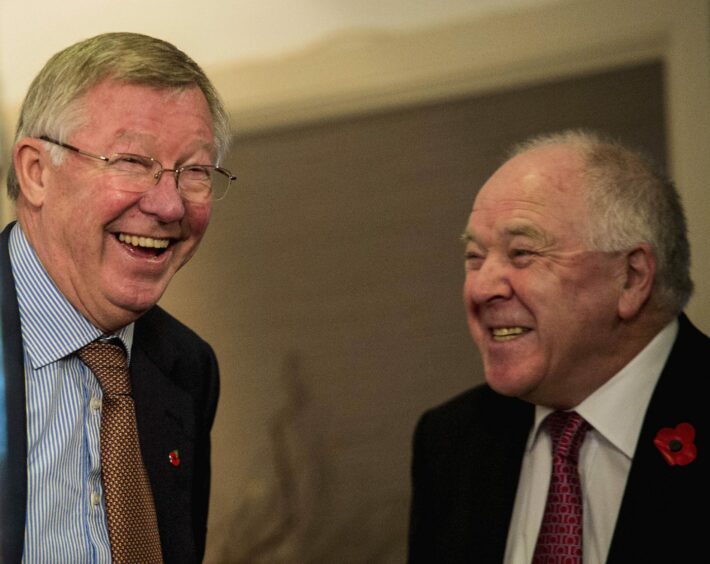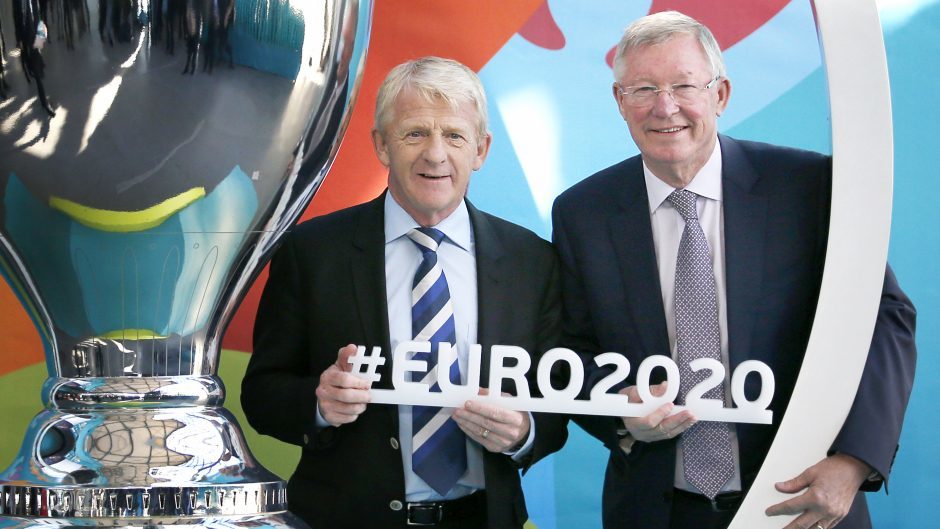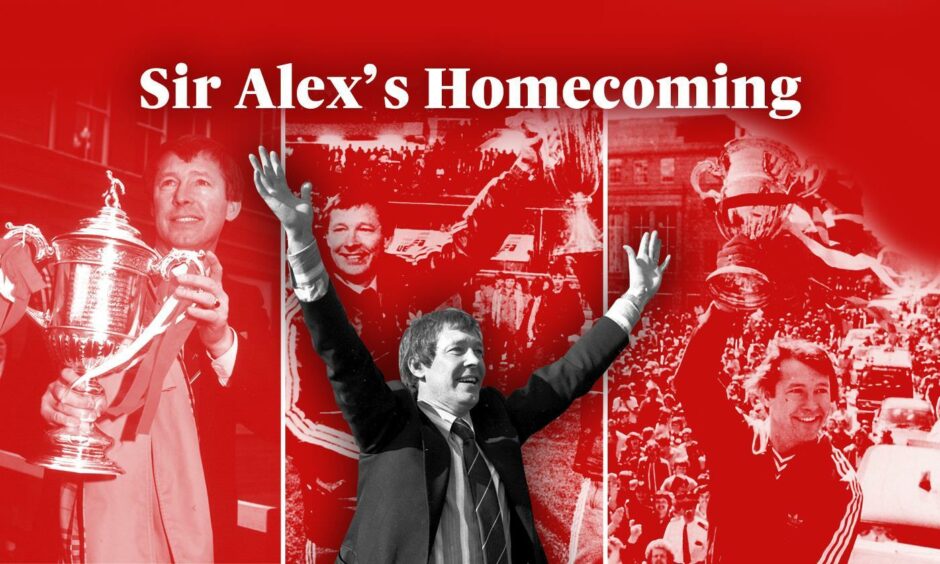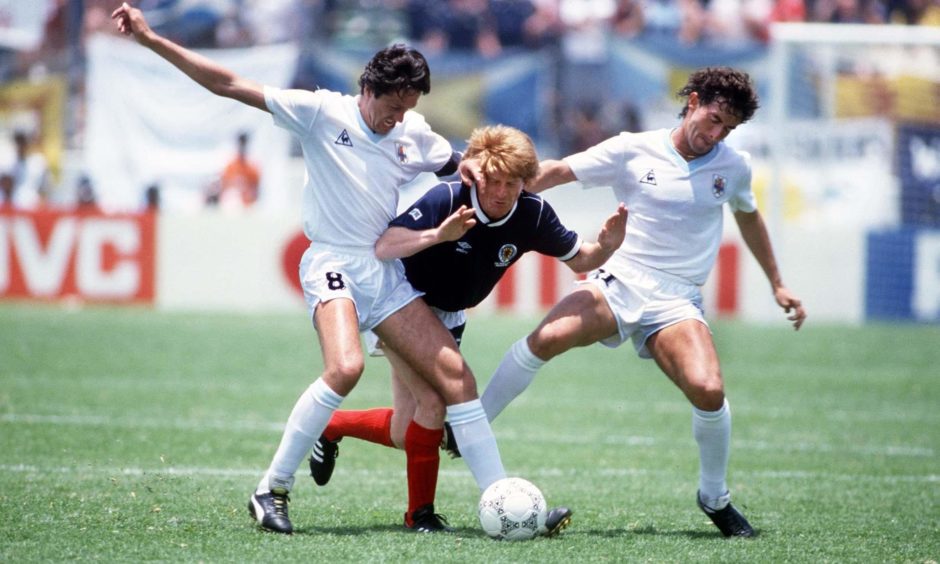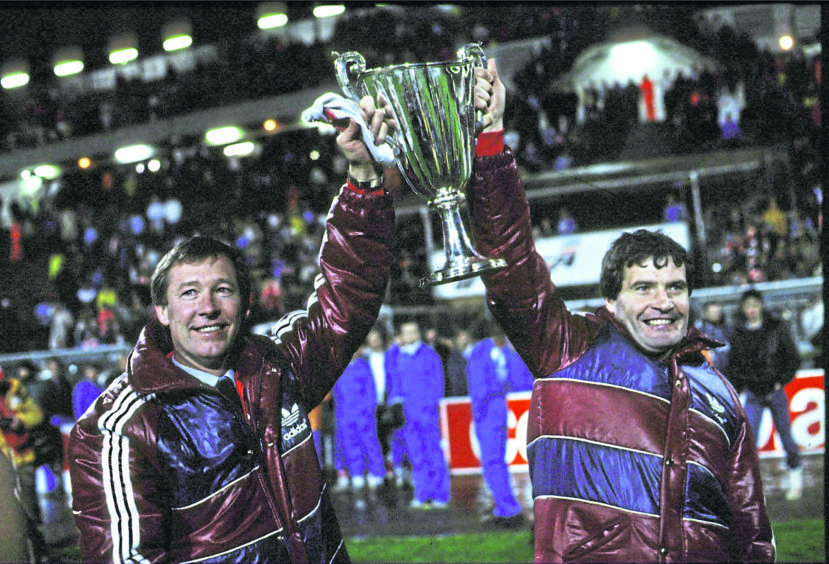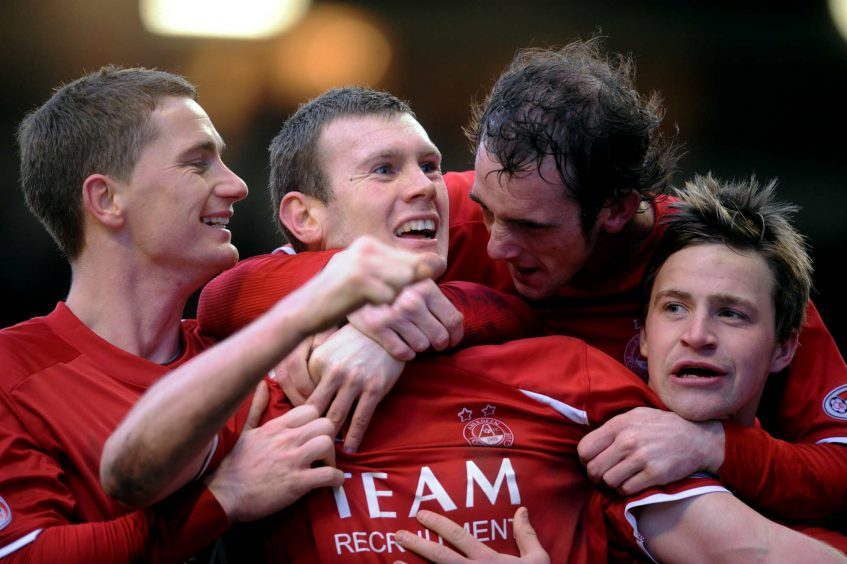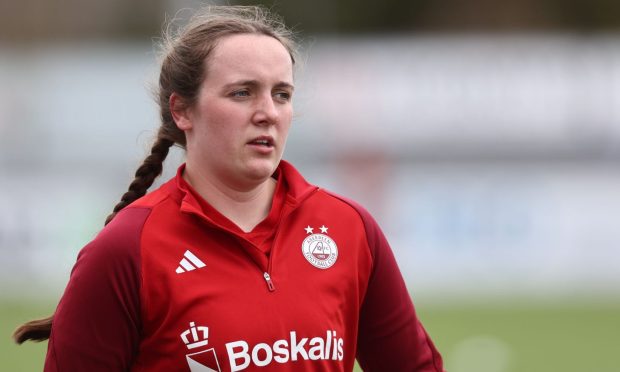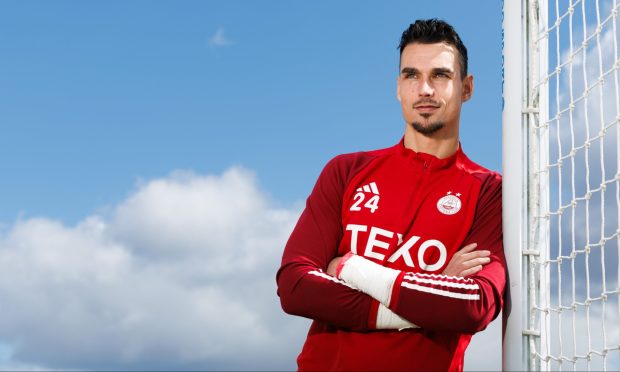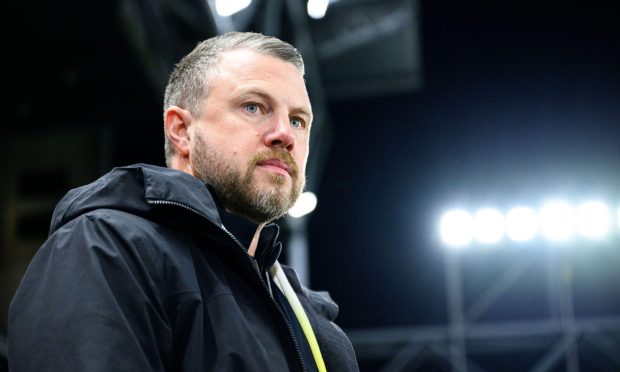As Sir Alex Ferguson prepares to return to Aberdeen for the unveiling of a statue in honour of his achievements at the Dons we will look ahead to Friday’s unveiling with former players and colleagues.
Sir Alex Ferguson is a proud Scot and one of the highlights of his career was undoubtedly managing his country at the World Cup finals in Mexico in 1986.
But Craig Brown insists it was never going to become permanent.
It fell to the then Aberdeen manager to take charge following the death of manager Jock Stein, an iconic figure in his own right, following the 1-1 draw with Wales in Cardiff in September 1985.
Ferguson, who doubled as part-time assistant to Stein with the national team, was the one who had to break the news to the players in Cardiff 30 minutes after the final whistle that the manager had passed away.
He was then asked to take charge for the World Cup play-off against Australia and the eventual finals in Mexico in the summer of 1986.
Craig Brown, who would follow in Ferguson’s footsteps by managing Scotland and the Dons, was not surprised to see Ferguson take charge but insists there was little chance of him becoming the national team boss permanently.
He said: “Alex was Jock’s assistant and he thought the world of Jock Stein. Jock was his mentor really, if anyone was, and Alex was fulsome in his praise of Jock.
“Like everyone, Alex was shattered when Jock passed away and as Jock’s assistant he was the one who had to tell the players on the fateful night in Cardiff.
“Following that game he got the job and I assume Aberdeen were okay about him doing the dual role.
“His respect and admiration for Dick Donald was immense. Dick took a chance on Alex by giving him a job and the opportunity to prove himself at Pittodrie and Alex always appreciated that.
“He could have had the Scotland job after Mexico but he wanted to stay in club football.”
Sir Alex was pursued by clubs while in Mexico
Ferguson had a club role of course as manager at Pittodrie but even though he was preparing the national team for the finals the interest from clubs in England had followed him overseas.
Brown said: “When we were preparing for the World Cup he received calls from Arsenal and Tottenham who both wanted him to be their new manager.
“I know this because he confided in me about it. He said to both of them ‘I’ll tell you after the World Cup.’
“I think a director of one club met a director of the other and once they realised one of them was guaranteed to lose out they both went for new managers in George Graham and David Pleat.
“A few months later of course Manchester United were struggling and Martin Edwards asked Gordon Strachan about Alex.
“Gordon told him if he wanted calmness and everything to keep going smoothly not to bother but if he wanted to progress and put a stick of dynamite under the football club bring Ferguson down.
“Martin Edwards, on Gordon’s somewhat unusual strong recommendation, made the approach for Alex and the rest was history.”
Brown believed he was being pranked when call came to join Ferguson in Mexico
For Brown, who was a part-time club manager in 1986, when the call came from Ferguson to join his backroom staff for Mexico two thoughts sprung to mind: this is a joke and how am I going to get time off work?
Brown said: “Alex took Walter Smith, Archie Knox and myself to Mexico as his coaches. It was an old pals’ act.
“I was working as a lecturer in education at the college in Ayr training teachers when I was given a message from the secretary saying Mr Ferguson was looking for me.
“It was common knowledge Alex was managing Scotland by this point and my immediate reaction was ‘this is Ally McCoist winding me up.’
“But I saw the number was an Aberdeen one so I called it back and it was Alex.
“He asked me would I come on the staff to Mexico and I told him I couldn’t. I had a job and I was a part-time manager at Clyde.
“He told me to ask for a month’s unpaid leave of absence. I asked the principal who put it to the board.
“They thought it was an honour to be asked to represent Scotland so they gave me a month’s paid leave which was good.
“When I told him I could manage his quote to me was ‘oh, that’s great. We’ve got three games to play but we won’t let that interfere with our enjoyment.’
“He was right because we had a very enjoyable time with the team.”
Ferguson was calmness personified in South America
Ask any of his former Aberdeen players, or Manchester United players for that matter, if they had a story about Ferguson’s famous temper and you would could likely form a queue a mile long.
But Brown insists the Ferguson who managed Scotland was a very different character.
He said: “We were in Santa Fe, New Mexico for 10 days doing training sessions before flying to Mexico four days before the first game.
“Alex was relaxed and happy. I’ve heard all the stories about the hairdryer but I think in all the time he had the Scotland job I never heard him raise his voice once.
“But when he spoke every player listened.
“In the team meeting the staff would sit beside him and it was the job of the assistants on the staff to look around the room and see the reaction of the players.
“Every player listened intently to everything he said. He was far more democratic than people give him credit for.
“He was interested in free kick routines players had worked on at their clubs and actively encouraged players to utilise set-plays they were comfortable with at club level.
“I thought he would be more dogmatic. He was specific but there was no aggression in his meetings.
“Sir Alex got the players on his side because of his knowledge and his success at Aberdeen.
“He had their respect from day one and players were almost nodding their heads when he spoke.”
World Cup finals were challenging for Scotland
Scotland’s campaign followed a path which by now has become all too familiar for the Tartan Army.
Defeats to Denmark and West Germany left Scotland needing to beat Uruguay in the final game to qualify.
The dismissal of Uruguay left back Jose Batista after just 56 seconds for a foul on Gordon Strachan remains a record in finals history to this day, but it did not help Scotland’s cause as an ill-tempered match ended goalless and Scotland were heading home.
But Brown believes the role of then SFA secretary Ernie Walker ensured Ferguson and his players returned home with their heads held high.
He said: “Nobody can tell me if Kenny Dalglish had been there we would have failed to win that game.
“In the last game against Uruguay we played against 10 men for 89 minutes. Can you imagine playing against 10 men with Dalglish and not scoring?
“Kenny was 35 and needed a knee operation so we had to go without him. Even then we did everything but win that game.
“Stevie Nicol missed a chance which to this day I believe I could have scored.
“I respected Ernie Walker’s man management before that game.
“We were sitting having breakfast on the morning of the game when Ernie asked Alex for a word.
“We hadn’t done particularly well in the two games against Denmark and West Germany but Alex came back into the restaurant and you would have thought a weight had been lifted from his shoulders.
“Ernie had told him everybody had acknowledged the terrific job he had done from the players to handling the media and there would be no recriminations if we lost the last game.
“It put Alex in a wonderful frame of mind.
“We drew and failed to qualify but Alex had been reassured he was still valued. Telling him that before the game was a well-timed and well-said move from Ernie – and it was true.”
High standards demanded on and off the pitch
Craig Brown may not have witnessed the famous Ferguson hairdryer on international duty but he knows all about Sir Alex Ferguson’s relentless quest for perfection.
Ferguson demanded the very best from his players in every aspect of their profession from their appearance to their performances on the pitch.
He would not accept anything less.
Brown said: “Archie Knox will tell you he was firm at Aberdeen with players and some were given a really hard time. He was inflexible at times at Aberdeen and Manchester United.
“Every manager has to do that but the impression I have is that he didn’t do it more than most.
“He didn’t tolerate anything less than an absolute response and discipline.
“If you didn’t do what you were told he was intolerant. It was things like timekeeping, having your tie tied properly up to your neck.
“He set standards and was firm and aggressive in ensuring they were maintained at all times.”
Sir Alex wanted to win at everything
Ferguson’s mentality was simple – he had to win to matter what the game or the stakes. Brown saw the man push that desire to extreme levels while on national team duty.
He said: “No-one beats Alex Ferguson in a quiz. In Trivial Pursuit, which we used to do with the staff, he was incredible.
“The only man who could get near him was Stewart Hillis, who was part of the medical staff, and he was a professor.
“When Alex was picking a team I noticed he always put the professor in his team. I got Archie.
“He loved nothing better than to rub it in if he won too. He would be right in your face lapping it up.
“You will never beat him in a quiz. If you are going to beat him, he’ll cheat.”
The light-hearted side to the man with steely demeanour
For all that passion and desire to win there are other sides to Sir Alex Ferguson which only those close to him get to see.
Craig Brown points to intelligence and wit – and a devilish sense of humour and he was quick to take advantage of it.
He said: “When Denis Law was given the freedom of Aberdeen I was asked to say a few words.
“I phoned Alex to ask if he had any words and he said he had a tale he could tell me.
“He was in a hotel in London with one of his sons when he met Pele.
“Pele said to him ‘you know what? There is only one British footballer who could have played for Brazil. Only one, without a doubt, Denis Law.’
“Alex told me I could tell that story but I should add ‘obviously Pele had never seen Zander Diamond.’ So I did use that line and the chairman Stewart Milne loved it.
“He has a great sense of humour, hyper-intelligence and wonderful sensitivity.
“He has done some great things for former players and he would think nothing of picking up the phone to talk to the family of an old team-mate if they were ill or passed away.”
